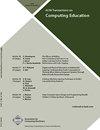Combining GitHub, Chat, and Peer Evaluation Data to Assess Individual Contributions to Team Software Development Projects
IF 3.2
3区 工程技术
Q1 EDUCATION, SCIENTIFIC DISCIPLINES
引用次数: 0
Abstract
Assessing team software development projects is notoriously difficult and typically based on subjective metrics. To help make assessments more rigorous, we conducted an empirical study to explore relationships between subjective metrics based on peer and instructor assessments, and objective metrics based on GitHub and chat data. We studied 23 undergraduate software teams (n = 117 students) from two undergraduate computing courses at two North American research universities. We collected data on teams’ (a) commits and issues from their GitHub code repositories, (b) chat messages from their Slack and Microsoft Teams channels, (c) peer evaluation ratings from the CATME peer evaluation system, and (d) individual assignment grades from the courses. We derived metrics from (a) and (b) to measure both individual team members’ contributions to the team, and the equality of team members’ contributions. We then performed Pearson analyses to identify correlations among the metrics, peer evaluation ratings, and individual grades. We found significant positive correlations between team members’ GitHub contributions, chat contributions, and peer evaluation ratings. In addition, the equality of teams’ GitHub contributions was positively correlated with teams’ average peer evaluation ratings and negatively correlated with the variance in those ratings. However, no such positive correlations were detected between the equality of teams’ chat contributions and their peer evaluation ratings. Our study extends previous research results by providing evidence that (a) team members’ chat contributions, like their GitHub contributions, are positively correlated with their peer evaluation ratings; (b) team members’ chat contributions are positively correlated with their GitHub contributions; and (c) the equality of team’ GitHub contributions is positively correlated with their peer evaluation ratings. These results lend further support to the idea that combining objective and subjective metrics can make the assessment of team software projects more comprehensive and rigorous.结合GitHub、Chat和同行评估数据评估个人对团队软件开发项目的贡献
评估团队软件开发项目是出了名的困难,通常基于主观指标。为了使评估更加严格,我们进行了一项实证研究,探索基于同伴和讲师评估的主观指标与基于GitHub和聊天数据的客观指标之间的关系。我们研究了23个本科生软件团队(n=117名学生),他们来自北美两所研究型大学的两门本科生计算课程。我们收集了团队的数据:(a)来自GitHub代码库的提交和问题,(b)来自Slack和Microsoft teams渠道的聊天消息,(c)来自CATME同行评估系统的同行评估评级,以及(d)课程的个人作业评分。我们从(a)和(b)中得出了衡量团队成员对团队的贡献的指标,以及团队成员贡献的平等性。然后,我们进行了皮尔逊分析,以确定指标、同行评估评级和个人成绩之间的相关性。我们发现团队成员的GitHub贡献、聊天贡献和同行评价之间存在显著的正相关。此外,团队GitHub贡献的平等性与团队的平均同行评价评级呈正相关,与这些评级的差异呈负相关。然而,在团队聊天贡献的平等性和他们的同伴评价评级之间没有发现这种正相关性。我们的研究扩展了之前的研究结果,提供了证据表明:(a)团队成员的聊天贡献,就像他们在GitHub上的贡献一样,与他们的同行评价呈正相关;(b) 团队成员的聊天贡献与他们在GitHub上的贡献呈正相关;以及(c)团队GitHub贡献的平等性与其同行评估评级呈正相关。这些结果进一步支持了这样一种观点,即结合客观和主观指标可以使团队软件项目的评估更加全面和严格。
本文章由计算机程序翻译,如有差异,请以英文原文为准。
求助全文
约1分钟内获得全文
求助全文
来源期刊

ACM Transactions on Computing Education
EDUCATION, SCIENTIFIC DISCIPLINES-
CiteScore
6.50
自引率
16.70%
发文量
66
期刊介绍:
ACM Transactions on Computing Education (TOCE) (formerly named JERIC, Journal on Educational Resources in Computing) covers diverse aspects of computing education: traditional computer science, computer engineering, information technology, and informatics; emerging aspects of computing; and applications of computing to other disciplines. The common characteristics shared by these papers are a scholarly approach to teaching and learning, a broad appeal to educational practitioners, and a clear connection to student learning.
 求助内容:
求助内容: 应助结果提醒方式:
应助结果提醒方式:


